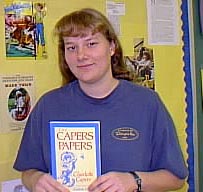Major Works
- The Caper’s Papers (1982) Foreword by Eudora Welty
- Charlotte Capers: Tennessee Williams, and the Mississippi premiere of ‘A Streetcar Named Desire.’ (critic, playwright) (The Mississippi Quarterly, Spring/1998)
Charlotte Capers: A Biography
By Sarah Jones (SHS)
Charlotte Capers, who wrote The Capers Papers,was born in Columbia, Tennessee in 1913, but grew up in Jackson, Mississippi (Abbott), where her father was an Episcopal rector (Boozer). She went to Millsaps College and in 1934 she received her bachelor’s degree from the University of Mississippi (Abbott) in English. With the hope of being a journalist, she got a job at the old Jackson Daily News, but the editor neglected to tell anyone she was hired; therefore, she never got paid (Miano).
Since she had no job, friends and family persuaded her to accept the position as secretary to Dr. W. D. McCain, the Director of the Department of Archives from 1955 to 1969. During this time she became a restoration expert and museum designer (Miano). Later, when she herself was director of Archives, the old capital was restored, the plans were completed for the Archives and History Building, and the State Historical Museum was organized (Abbott).
After planning and overseeing the restoration of the old capital, Capers won an Award of Merit from the American Association for State and Local History (Evans). After she resigned in 1969, she became the director of information and education; and because of this, she became director of department publications (Abbott). In 1972 the job as principal executive was appointed to her for the restoration of the governor’s mansion (Abbott), and when she retired in 1983, in honor of her, the Archives and History Building was named (Abbott).
Capers wrote ninety-nine book reviews for The New York Times Book Review (Evans). She also edited many books on the history of Mississippi and the south. She was editor-in-chief of the Journal of Mississippi History from 1956-1969 (Evans), and she did historical articles for Encyclopedia Britannica (Abbott). Her book The Caper’s Papers contains the essays that she wrote for The Jackson Daily News, Jackson Star-Times articles , and her “Good Life” pieces in The Delta Review (Abbott). “Miss Quotes” is the byline that appears under the columns (Boozer). The foreword of the The Capers Papers is done by Eudora Welty, who writes, “The pieces vary in subject and mood and kind. But they convey in common a warmth of feeling you won’t fail to recognize as Charlotte’s own” (Abbott). After Charlotte’s death Lynn Evans wrote “She loved this state and spent her professional lifetime trying to save and to share what was good and true about it.”
Reviews
A Review of “My Dog Holly“
By Sarah Jones (SHS)
In the book The Capers Papers by Charlotte Capers there are over thirty different essays that came from her newspaper columns. One of these is “My Dog Holly.” In this story Charlotte describes in a humorous way a dog of hers named Holly. Now Holly was very outgoing even when she was a puppy. Charlotte explains this by telling of the day she got her. Charlotte one day was walking down the street and went into a garden shop that had a few animals “thrown in” as Charlotte describes it (37). Charlotte didn’t have to look for Holly. Holly had already found Charlotte and was pawing her to make sure she knew this. “She did not weep or moan, and she surely didn’t cringe. She just perked up her ears, held her tail high, and grabbed me. Then she slapped me on the wrist with her paw, as if to say, ‘Here! Take me! Let’s get the hell out of here!'” explains Capers (37). Holly was very outgoing and hand many bloody dogfights that she won. The laundry man didn’t like her, neither did a whole lot of other people, but she didn’t like them either. Holly was a brave and loyal dog that had, as Capers explains, “a lot of heart “(41). Or in Holly’s words, “I’ve got guts, you mean, and damn that laundryman” (41)!
A Review of “Pass the Pesticide, Pappy”
By Sarah Jones (SHS)
Bugs can ruin a day, especially when it concerns your house. Charlotte describes the agony of trying to get rid of the pest in one of the essays in her book called “Pass the Pesticide, Pappy.” In this essay or story, as I call it, Charlotte describes how they killed bugs in the old days compared to today, and how one day she got rid of a beehive. In the old days they used trapsand poison and anything else that seemed to work, but the people did survive or as Charlotte describes it, “we pulled through the pests of our childhood to arrive fully grown in the brave new world of pest control” (31). The world today has pest control but nothing for bees as Charlotte soon found out. This story is excellent for those who like to laugh. In fact, I would recommend the book The Capers Papers.
Related Websites
Bibliography
- Abbott, Dorothy, ed. “Reflections of Childhood and Youth.” Mississippi Writers. Volume II: Nonfiction. Jackson: U P Mississippi, 1986. 692
- Boozer, William. “Lady of Letters.” Commercial Appeal. October 31, 1982.
- Capers, Charlotte. “My Dog Holly.” The Capers Papers. Jackson: U P Mississippi, 1982. 36-41.
- — —–. “Pass the Pesticide, Pappy.” The Capers Papers. Jackson: U P Mississippi, 1982. 31-34.
- Evans, Linda. Readers’ View: “Story teller Charlotte Capers was a gift to the state.” Clarion Ledger. January 1, 1997.
- Miano, Bert Joseph. “Accidental Archivist: Building finds ally in Capers.” The Northside Sun. December 6, 1990.

